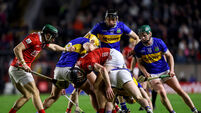Israeli forces mass on Lebanese border
Israeli troops and tanks massed on Lebanon’s border today and officials said the army was preparing for a limited incursion in Lebanon in the near future.
Israel’s 10-day offensive in Lebanon has mostly been fought by air and naval forces, but Israeli soldiers have conducted several limited operations near the border to target Hezbollah guerrillas and their outposts.














